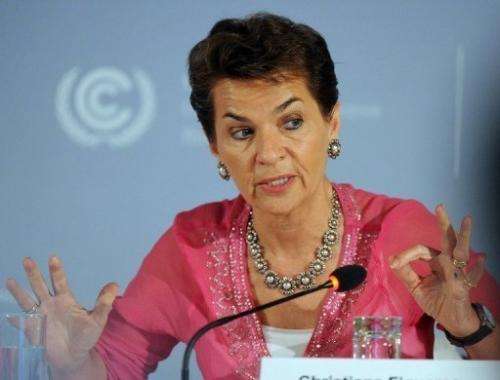Mixed-bag climate conference closes in Bonn

Talks towards a worldwide climate pact wrapped up Friday with delegates claiming progress, even though a procedural bust-up with Russia blocked important work.
With just over 900 days left to a 2015 deadline for signing the UN's most ambitious environmental deal, the negotiations in Bonn sought to lay the groundwork for a ministerial-level huddle in Warsaw in November.
Due to enter into force by 2020, the agreement would for the first time bind all the world's nations to measurable targets for curbing Earth-warming greenhouse-gas emissions.
Its aim is to avoid the most calamitous warming-induced climate effects—worsening droughts, floods, storms and sea-level rise—by meeting a goal to limit global warming to two degrees Celsius (3.6 degrees Fahrenheit) over pre-industrial levels.
Delegates and officials pointed to a positive mood which had helped them to explore the broad outlines of a deal.
"We are encouraged by the progress that has been reached here," Christiana Figueres, head of the UN Framework Convention on Climate Change (UNFCCC), told journalists.
But there was dissatisfaction with a Russian objection that paralysed one of three working groups throughout the 12-day get-together.
The Subsidiary Body for Implementation (SBI) finally threw in the towel on Tuesday after more than a week of wrangling without doing any work.
Accused of putting narrow politics before the urgent need to halt global warming, Russia had insisted that a discussion on procedure be added to the SBI's agenda for Bonn.
It was backed by Ukraine and Belarus.
Moscow objects to the way the last big climate conference, in Doha, Qatar, closed in December—the chairman gavelling through a deal in spite of Russian objections.
"It is a regrettable setback... since it means that no formal work was done," European Union climate envoy Jurgen Lefevere said of the Russian blockade.
Europe has proposed making a diplomatic push to persuade Russia to let the SBI resume in Warsaw.
The SBI was meant to start a discussion on a global mechanism to compensate countries for climate change-related loss and damage, as well as draft the 2014-2015 budget for the UNFCCC secretariat.
It was also supposed to work on a review of whether the UN's target of 2 C should be lowered to a safer 1.5 C.
"We have lost very important discussions which should have happened," said Azeb Girmai, representing a group of least-developed countries.
"People are dying as we speak... losing their productive capacity, territories and islands."
But delegates seemed upbeat about exploratory talks that took place in a wider forum, the Ad Hoc Working Group on the Durban Platform (ADP).
According to a UNFCCC statement, "concrete progress" was made towards the new climate pact.
"Notwithstanding the deadlock... this has been a productive session and parties have worked together," said Irish negotiator David Walsh.
Figueres stressed it remained "achievable" to close the gap between government pledges for curbing greenhouse gases and the cuts actually needed.
Europe has suggested a hybrid system combining elements from a "bottom-up" approach favoured by the United States—in which nations themselves determine their contribution—and a "top-down" approach that would place national targets under close scrutiny.
Under the European idea, nations would determine their own pledges, but these would be reviewed by their peers before being signed into the new, binding deal.
Lobby group Greenpeace said more urgency was required.
"We'd like to see just a bit of the acceleration of the (climate) crisis reflected in the talks," said Greenpeace senior policy adviser Ruth Davis.
This included rich countries pledging money to help developing states adapt to climate impacts caused by man-made global warming, Davis said.
The talks in Bonn took place as floods battered parts of central Europe—including conference host Germany.
Figueres announced Friday that Peru will host the 2014 ministerial-level talks. France will stage the 2015 event.
© 2013 AFP




















